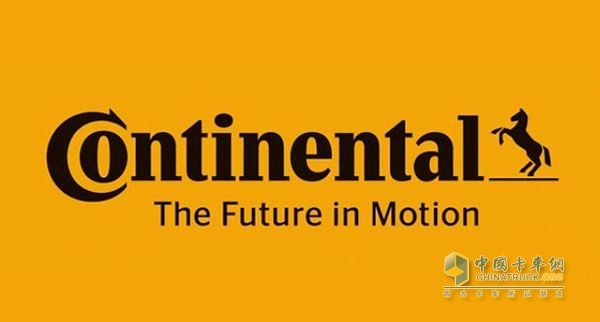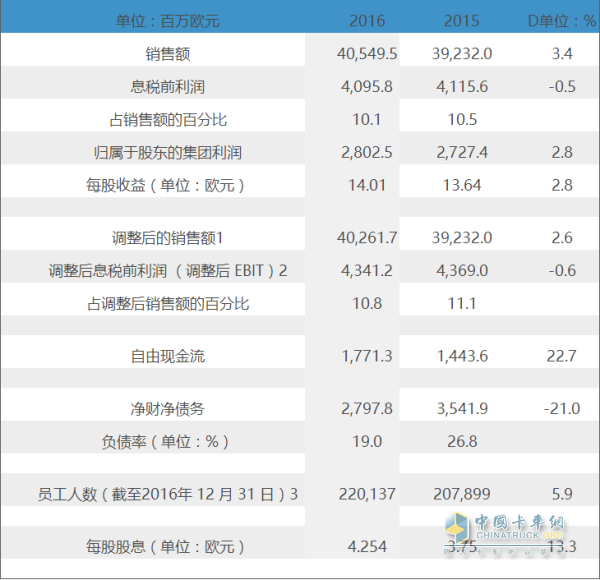Continental successfully completed its performance in FY16. Sales reached 40.5 billion euros, a growth rate of 3%, and the adjusted EBIT margin was 10.8%. “After-tax profit of 2.8 billion euros, and earnings per share of 14.01 euros, both show that we have made a little progress compared to last year’s brilliant results. Our growth rate has once again surpassed the average growth rate of the industry.†Dr. Genhardt said. This is a welcome increase compared to the adverse effects announced in the third quarter. “Without these individual incidents, the year just passed could be a year of record refreshing. Therefore, as a whole, we have achieved very significant successes and we should distribute dividends to our shareholders. So I recommend raising it for the fifth time in a row. Dividends are distributed at 4.25 euros per share," Dr. Degenhardt emphasized. Dr. Degenhardt believes that auto parts suppliers, tire manufacturers and partners in the industrial field are all well prepared for future development: “The Continental Group has a stable financial position and strong technical strength. We will be able to adapt to the future.†Although the economic and political environment facing the company is more complex, the good performance of the company at the beginning of the year has set a good example for the target set in 2017. “We expect sales to increase to more than 43 billion euros. This means that our growth rate will still be higher than the market average. Despite rising raw material prices, we still hope to achieve an adjustment of more than 10.5% throughout the year. After-tax EBITDA,†Dr. Degenhardt announced. Continental Group expects global vehicle production this year to increase by 1% to nearly 94 million units. According to the company’s forecast, the growth of production in China and Europe and the steady development of the sales market in Brazil and Russia will compensate for the slightly declining growth in the US market. Further enhance our technological leadership in advanced driver assistance systems In the rapidly growing advanced driver assistance systems market, Continental has further enhanced its leading position: In 2016, the company set a total of more than 3 billion euros in orders for sensors and software. This high-tech company has invested a total of about 1 billion euros in technology and software research and development over the past five years: “Our goal is to make traffic accidents a thing of the past. At present, advanced driver assistance systems have helped hundreds worldwide The million drivers are free from traffic accidents and casualties. By further developing important sensors and improving their environmental recognition capabilities, we will make significant advances in the field of road traffic and further increase the degree of automation and driving safety,†Dr. Degenhardt said. Explained. Therefore, the company is committed to the large-scale use of three-dimensional laser scanning radar technology. It is similar to an echo detector and can provide high-precision, distortion-free images of the vehicle's ambient environment through laser pulses. It is expected that Continental will use this highly efficient technology in vehicles since 2020. This is a prerequisite for automation and driverless driving. The future belongs to clean, smart and connected vehicles “More than two-thirds of the population is expected to live in cities in 2050. Preliminary assessments indicate that most of the motor vehicles in these cities are operated by traffic providers and fleet operators. It is expected that they will all be equipped with electricity. Drives, full networking, and autonomous driving will open up new business areas for us. Therefore, in addition to the current products, the core business of the future Continental Group will also include intelligent transportation services,†explains Dr. Degenhardt. In the field of electric vehicles, Continental Group is currently at the leading level. “Over the past few years, we have invested more than 1 billion euros in the development of electric vehicles. Today, we are actively fulfilling orders from major global markets. But if we want to make a major breakthrough, battery technology needs to develop by leaps and bounds. We expect this to happen. It will not be achieved until 2024, or even later," Dr. Degenhardt said. Continental Group expects decisive changes in the field of vehicle intelligent interconnection. In the future, communications between vehicles and between vehicles and infrastructure will be further strengthened. As a result, the Continental Group obtained road data and car data through intelligent networking. Since 2012, it has helped the global truck diesel consumption to decrease by 390 million liters. In the future, direct communication between the car and its drivers will avoid more traffic accidents. At the end of 2017, the Continental Group will also mass-produce an in-vehicle camera. In the future, the car can recognize whether the driver perceives relevant information and has responded accordingly. Both sales and net profit increase Continental Group Chief Financial Officer Wolfgang Schaefer expressed satisfaction with the preliminary statistics' annual performance data: “As announced, we achieved sales growth in 2016. In addition, despite the existence of October With the unfavorable factors announced, our net profit still maintained a growth trend.†In 2016, a number of factors (including quality related issues) caused a total loss of 480 million euros to the company. Sales grew by more than 1.3 billion euros, a growth rate of approximately 3.4%, reaching 40.5 billion euros. The organic growth rate of sales (that is, regardless of consolidation effect and exchange rate changes) was 4.7%. In FY 2016, EBIT was still EUR 4.1 billion, which was the same as the previous year. The adjusted EBIT margin was 10.1%, down from 10.5% in 2015. In 2016, the adjusted EBIT, excluding the scope effect, M&A, depreciation and special expenses, was 4.3 billion euros, and the profit rate based on adjusted sales was 10.8%. The adjusted EBIT was lower than the previous year's 4.4 billion euros. In 2015, the EBIT margin calculated based on adjusted sales was 11.1%. R & D cost increase is a reflection of the changes in the automotive industry In 2016, Continental invested a total of EUR 2.6 billion in fixed assets, plant equipment and software. The investment rate was 6.4%, compared with 5.6% in the previous year. R&D expenditures increased by 14.8% from the previous year to more than 2.8 billion euros, accounting for 6.9% of sales, compared to 6.2% in the previous year. “The automotive industry is undergoing a transformation. We are actively committed to providing new intelligent transportation solutions and services in this transformation. The increase in software requirements means more research and development costs, while at the same time investment in fixed capital is reduced accordingly. Historical data shows that this will not have a negative impact on the profitability of our auto group, but will also increase the value we create,†Schaefer said. As of the end of 2016, the Continental Group had a total of EUR 6 billion in liquidity buffer funds, of which approximately EUR 2.1 billion in liquidity and EUR 3.9 billion had been promised but unused credit lines. Compared to the end of 2015, liquidity increased by 762 million euros. "The available funds ensure our flexibility and maximized responsiveness," Schäfer added. The good development momentum has also brought about an increase in the number of employees: By the end of 2016, the company had a total of approximately 220,000 employees, an increase of approximately 12,000 from the end of 2015. In addition to the expansion of production scale, the increase in the number of employees should be mainly attributed to mergers and acquisitions. The Continental Group is committed to developing smart technologies for passenger and cargo transportation. As a reliable partner, this international auto parts supplier, tire manufacturer and industrial partners provide customers with sustainable, safe, comfortable, personalized and cost-effective solutions. In 2016, Continental Group achieved sales of 40.5 billion euros with the joint efforts of chassis and safety, body electronics, powertrain, tires and ContiTech's five business units. The Group employs more than 220,000 employees worldwide in 56 countries. Since it officially began operating in the Chinese market in 1994, Continental has served major auto manufacturers in various automotive market segments. At the same time, we also develop and produce materials, functional components, components and systems that are widely used in rail transportation, machinery, engineering, mining and other important industrial industries. At present, the Continental Group has a total of 26 production bases and 17 R&D centers in China with a total of more than 25,000 employees. The five major business units of the Continental Group provide tailor-made solutions for the Chinese market. Powder Particulate Matter Packaging Machine Weighing And Packing Machine,Powder Particulate Matter Packaging Machine,Automatic Feed Packaging Machine,Automatic Fertilizer Packaging Machine Jiangyin Lingji Automation Equipment Co., Ltd. , https://www.lingjimachine.com Continental Group
Continental Group  Capital Details
Capital Details
Continental Group's 2016 earnings: sales of 40.5 billion euros
The Continental Group managed to achieve its annual target for adjustments in autumn safely in FY 2016, and some of its goals have been exceeded. At the same time, the company has paved the way for future earnings growth: “Today, we are committed to the research and development and production of advanced technology equipment for passenger and cargo transportation. In the future, we will increase profits through mobile transportation servicesâ€, Chairman of the Executive Board of the Continental Group Dr. Elmar Degenhart stated at the preliminary data for FY 2016 in Hanover on Thursday. “The automotive industry is undergoing a transformation. The same is true of our business model. There have been few historic moments that have been so exciting and full of opportunities. We will strive to build the future of driving,†he added.